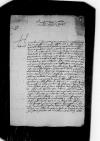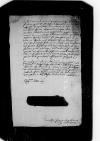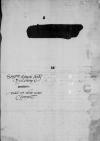Non possum non male affecto animo Serenissimae Maiestati Vestrae conqueri on the margin⌈conquericonqueri on the margin⌉ contra quendam Alexander Sculteti (Scholtcze) (*ca. 1485 – †1570), doctor of canon law, cartographer, historian and friend of Copernicus; accused by Dantiscus and Stanisław Hozjusz (Hosius) of Sacramentarian heresy, in 1540 banished by King Sigismund I Jagiellon; in 1541 imprisoned by the Inquisition in Rome; after release from prison in 1544 he stayed in Rome for the rest of his life; 1509-1516 notary at the Roman Curia; 1519-1541 Canon of Ermland (Warmia), 1530-1539 Chancellor of the Ermland Chapter; 1536-1538 administrator of the komornictwo of Mehlsack (Melzak, today Pieniężno) (KOPICZKO 2, p. 299; SBKW, p. 219-220)⌊Alexandrum ScultetiAlexander Sculteti (Scholtcze) (*ca. 1485 – †1570), doctor of canon law, cartographer, historian and friend of Copernicus; accused by Dantiscus and Stanisław Hozjusz (Hosius) of Sacramentarian heresy, in 1540 banished by King Sigismund I Jagiellon; in 1541 imprisoned by the Inquisition in Rome; after release from prison in 1544 he stayed in Rome for the rest of his life; 1509-1516 notary at the Roman Curia; 1519-1541 Canon of Ermland (Warmia), 1530-1539 Chancellor of the Ermland Chapter; 1536-1538 administrator of the komornictwo of Mehlsack (Melzak, today Pieniężno) (KOPICZKO 2, p. 299; SBKW, p. 219-220)⌋ canonicum Varmiensem, Rome (Roma), city in central Italy, on the Tiber river, seat of the Holy See⌊RomaeRome (Roma), city in central Italy, on the Tiber river, seat of the Holy See⌋ publicum aliquando (vocabulum pro veritate mitius non reperitur) lenonem. Alexander Sculteti (Scholtcze) (*ca. 1485 – †1570), doctor of canon law, cartographer, historian and friend of Copernicus; accused by Dantiscus and Stanisław Hozjusz (Hosius) of Sacramentarian heresy, in 1540 banished by King Sigismund I Jagiellon; in 1541 imprisoned by the Inquisition in Rome; after release from prison in 1544 he stayed in Rome for the rest of his life; 1509-1516 notary at the Roman Curia; 1519-1541 Canon of Ermland (Warmia), 1530-1539 Chancellor of the Ermland Chapter; 1536-1538 administrator of the komornictwo of Mehlsack (Melzak, today Pieniężno) (KOPICZKO 2, p. 299; SBKW, p. 219-220)⌊IsAlexander Sculteti (Scholtcze) (*ca. 1485 – †1570), doctor of canon law, cartographer, historian and friend of Copernicus; accused by Dantiscus and Stanisław Hozjusz (Hosius) of Sacramentarian heresy, in 1540 banished by King Sigismund I Jagiellon; in 1541 imprisoned by the Inquisition in Rome; after release from prison in 1544 he stayed in Rome for the rest of his life; 1509-1516 notary at the Roman Curia; 1519-1541 Canon of Ermland (Warmia), 1530-1539 Chancellor of the Ermland Chapter; 1536-1538 administrator of the komornictwo of Mehlsack (Melzak, today Pieniężno) (KOPICZKO 2, p. 299; SBKW, p. 219-220)⌋ cum me et auctoritatem Serenissimae Maiestatis Vestrae a multis iam annis Rome (Roma), city in central Italy, on the Tiber river, seat of the Holy See⌊RomaeRome (Roma), city in central Italy, on the Tiber river, seat of the Holy See⌋ sit persecutus, idque impune, et bis me prius ex canonicatu Varmiensi, quem vigore nominationis Serenissimae Maiestatis Vestrae habui, per mentales reservationes eiecerit et non parvis expensis me afflixerit, ad praesens etiam postquam negotium coadiutoriae tractari coeptum est, quo fortassis malignantium ecclesiae placeat voluntatique Serenissimae Maiestatis Vestrae et fortunis meis reluctetur ex canonicatu, quem possideo ad postulationem serenissimae Bona Sforza (*1494 – †1557), Queen of Poland and Grand Duchess of Lithuania (1518-1557); the second wife of Sigismund I Jagiellon; Duchess of Bari and Rossano; daughter of Gian Galeazzo Sforza of Milan and Isabella of Aragon⌊reginalis maiestatisBona Sforza (*1494 – †1557), Queen of Poland and Grand Duchess of Lithuania (1518-1557); the second wife of Sigismund I Jagiellon; Duchess of Bari and Rossano; daughter of Gian Galeazzo Sforza of Milan and Isabella of Aragon⌋ ex collatione mensis ordinarii, explodere me conatur, ne quis sit apud Ermland (Warmia, Varmia), diocese and ecclesiastical principality in northeastern Poland, 1466-1772 within the Kingdom of Poland, Royal Prussia⌊illam ecclesiamErmland (Warmia, Varmia), diocese and ecclesiastical principality in northeastern Poland, 1466-1772 within the Kingdom of Poland, Royal Prussia⌋, qui singulari quadam fide Serenissimae Maiestati Vestrae devinciatur. Quod hucusque ab illis cautum est quam diligentissime, cum soli sint inter tot et tam claras atque excellentes Serenissimae Maiestatis Vestrae ecclesias, qui libera potiantur electione neminemque vel admodum paucos admittunt in collegium, nisi eos, qui Rome (Roma), city in central Italy, on the Tiber river, seat of the Holy See⌊RomaeRome (Roma), city in central Italy, on the Tiber river, seat of the Holy See⌋ alti malisque artibus usi creverunt eosque in maiore habent pretio, qui maxime potestati et auctoritati Serenissimae Maiestatis Vestrae sunt aliquando adversati, qua in re Alexander Sculteti (Scholtcze) (*ca. 1485 – †1570), doctor of canon law, cartographer, historian and friend of Copernicus; accused by Dantiscus and Stanisław Hozjusz (Hosius) of Sacramentarian heresy, in 1540 banished by King Sigismund I Jagiellon; in 1541 imprisoned by the Inquisition in Rome; after release from prison in 1544 he stayed in Rome for the rest of his life; 1509-1516 notary at the Roman Curia; 1519-1541 Canon of Ermland (Warmia), 1530-1539 Chancellor of the Ermland Chapter; 1536-1538 administrator of the komornictwo of Mehlsack (Melzak, today Pieniężno) (KOPICZKO 2, p. 299; SBKW, p. 219-220)⌊AlexanderAlexander Sculteti (Scholtcze) (*ca. 1485 – †1570), doctor of canon law, cartographer, historian and friend of Copernicus; accused by Dantiscus and Stanisław Hozjusz (Hosius) of Sacramentarian heresy, in 1540 banished by King Sigismund I Jagiellon; in 1541 imprisoned by the Inquisition in Rome; after release from prison in 1544 he stayed in Rome for the rest of his life; 1509-1516 notary at the Roman Curia; 1519-1541 Canon of Ermland (Warmia), 1530-1539 Chancellor of the Ermland Chapter; 1536-1538 administrator of the komornictwo of Mehlsack (Melzak, today Pieniężno) (KOPICZKO 2, p. 299; SBKW, p. 219-220)⌋ iste strenuam semper navavit operam.
Quapropter Serenissimae Maiestati Vestrae humillime supplico, dignetur reverendissimo Mauritius Ferber (*1471 – †1537), doctor of both canon and civil law; from 1507 Canon of Ermland (Warmia) and Lübeck; from 1514 Canon of Trier; 1512-1515 parish priest of the Church of Saints Peter and Paul in Gdańsk (Danzig); from 1516 Custos of Ermland and parish priest of the Church of the Blessed Virgin Mary in Gdańsk; from 1519 Canon of Dorpat; from 1523 Canon of Revel; 1523-1537 Bishop of Ermland (KOPICZKO 2, p. 71-72; SBKW, p. 59-60)⌊domino VarmiensiMauritius Ferber (*1471 – †1537), doctor of both canon and civil law; from 1507 Canon of Ermland (Warmia) and Lübeck; from 1514 Canon of Trier; 1512-1515 parish priest of the Church of Saints Peter and Paul in Gdańsk (Danzig); from 1516 Custos of Ermland and parish priest of the Church of the Blessed Virgin Mary in Gdańsk; from 1519 Canon of Dorpat; from 1523 Canon of Revel; 1523-1537 Bishop of Ermland (KOPICZKO 2, p. 71-72; SBKW, p. 59-60)⌋, cui nullam impingo culpam, et Ermland Chapter cathedral chapter based in Frauenburg (Frombork, Varmia)⌊capituloErmland Chapter cathedral chapter based in Frauenburg (Frombork, Varmia)⌋ seorsum serio scribere et mandare, ut hominem adeo  BNW BOZ TG 15 nr 1712, f. 26v votis Serenissimae Maiestatis Vestrae et fortunis meis reluctantem, qui me Rome (Roma), city in central Italy, on the Tiber river, seat of the Holy See⌊RomaeRome (Roma), city in central Italy, on the Tiber river, seat of the Holy See⌋, tum cum essem apud Charles V of Habsburg (*1500 – †1558), ruler of the Burgundian territories (1506-1555), King of Spain as Charles I (1516-1556), King of Naples and Sicily, King of the Romans (1519-1530), Holy Roman Emperor of the German Nation (elected 1519, crowned 1530, abdicated 1556); son of Philip I the Handsome and Joanna the Mad of Castile⌊caesaremCharles V of Habsburg (*1500 – †1558), ruler of the Burgundian territories (1506-1555), King of Spain as Charles I (1516-1556), King of Naples and Sicily, King of the Romans (1519-1530), Holy Roman Emperor of the German Nation (elected 1519, crowned 1530, abdicated 1556); son of Philip I the Handsome and Joanna the Mad of Castile⌋ Serenissimae Maiestatis Vestrae orator, vagum hominem, per principum saecularium curias discurrentem, publice depinxit, ab istiusmodi insolentiis ac frivolis sycophantiis compescant, vel quod multo esset commodius, si desistere nollet, quod illi erit difficillimum rabulae, ut aliquamdiu arci Marienburgensi in pane doloris praeesset, aliis in exemplum, qui nihil aliud moliuntur, quam ut se auctoritati Serenissimae Maiestatis Vestrae opponant et sese omnibus modis ex illa extrahant, nescio quam libertatem somniantes, cum Serenissimae Maiestati Vestrae subsimus omnes.
BNW BOZ TG 15 nr 1712, f. 26v votis Serenissimae Maiestatis Vestrae et fortunis meis reluctantem, qui me Rome (Roma), city in central Italy, on the Tiber river, seat of the Holy See⌊RomaeRome (Roma), city in central Italy, on the Tiber river, seat of the Holy See⌋, tum cum essem apud Charles V of Habsburg (*1500 – †1558), ruler of the Burgundian territories (1506-1555), King of Spain as Charles I (1516-1556), King of Naples and Sicily, King of the Romans (1519-1530), Holy Roman Emperor of the German Nation (elected 1519, crowned 1530, abdicated 1556); son of Philip I the Handsome and Joanna the Mad of Castile⌊caesaremCharles V of Habsburg (*1500 – †1558), ruler of the Burgundian territories (1506-1555), King of Spain as Charles I (1516-1556), King of Naples and Sicily, King of the Romans (1519-1530), Holy Roman Emperor of the German Nation (elected 1519, crowned 1530, abdicated 1556); son of Philip I the Handsome and Joanna the Mad of Castile⌋ Serenissimae Maiestatis Vestrae orator, vagum hominem, per principum saecularium curias discurrentem, publice depinxit, ab istiusmodi insolentiis ac frivolis sycophantiis compescant, vel quod multo esset commodius, si desistere nollet, quod illi erit difficillimum rabulae, ut aliquamdiu arci Marienburgensi in pane doloris praeesset, aliis in exemplum, qui nihil aliud moliuntur, quam ut se auctoritati Serenissimae Maiestatis Vestrae opponant et sese omnibus modis ex illa extrahant, nescio quam libertatem somniantes, cum Serenissimae Maiestati Vestrae subsimus omnes.
In Provincial Diet of Royal Prussia ⌊conventuProvincial Diet of Royal Prussia ⌋ Marienburgensi indicta est Serenissimae Maiestati Vestrae contributio, quam quomodo praestare debeam, cum debitis in servitio Serenissimae Maiestatis Vestrae et pro eius honore et Poland (Kingdom of Poland, Polonia)⌊regniPoland (Kingdom of Poland, Polonia)⌋ contractis sim graviter adhuc implicatus, singularis Serenissimae Maiestatis Vestrae erga me gratia clementer videat. Velim equidem eam mihi a Domino Deo sortem obvenisse, ut quam plurimum Serenissimae Maiestati Vestrae contribuere possem, nihil profecto pro mea erga Serenissimam Maiestatem Vestram superinscribed⌈VestramVestram superinscribed⌉ fide et puro animi mei affectu facerem libentius, sed deest facultas. Imploro itaque Serenissimae Maiestatis Vestrae solitam erga me benignitatem et quemadmodum reverendissimo Mauritius Ferber (*1471 – †1537), doctor of both canon and civil law; from 1507 Canon of Ermland (Warmia) and Lübeck; from 1514 Canon of Trier; 1512-1515 parish priest of the Church of Saints Peter and Paul in Gdańsk (Danzig); from 1516 Custos of Ermland and parish priest of the Church of the Blessed Virgin Mary in Gdańsk; from 1519 Canon of Dorpat; from 1523 Canon of Revel; 1523-1537 Bishop of Ermland (KOPICZKO 2, p. 71-72; SBKW, p. 59-60)⌊domino VarmiensiMauritius Ferber (*1471 – †1537), doctor of both canon and civil law; from 1507 Canon of Ermland (Warmia) and Lübeck; from 1514 Canon of Trier; 1512-1515 parish priest of the Church of Saints Peter and Paul in Gdańsk (Danzig); from 1516 Custos of Ermland and parish priest of the Church of the Blessed Virgin Mary in Gdańsk; from 1519 Canon of Dorpat; from 1523 Canon of Revel; 1523-1537 Bishop of Ermland (KOPICZKO 2, p. 71-72; SBKW, p. 59-60)⌋, sic et mihi, quaeso, credatur collectio, quae minoribus fiet in Ermland (Warmia, Varmia), diocese and ecclesiastical principality in northeastern Poland, 1466-1772 within the Kingdom of Poland, Royal Prussia⌊episcopatu meoErmland (Warmia, Varmia), diocese and ecclesiastical principality in northeastern Poland, 1466-1772 within the Kingdom of Poland, Royal Prussia⌋ expensis quam per exactores et non cum minore fide.
Intellexi venerabilem dominum Jan Lewicki (†1555), before 1522 sollicitator for Primate Jan Łaski's affairs in Rome, 1522 Latin secretary to Queen Bona Sforza; ca. 1524 Cantor in Płock; 1535 superintendent of Płock cathedral; 1535 presented to the parish in Biała and to the canonry of St. Michael's collegiate church in Płock; 1538 Commendatory Abbot of the monastery of Canons Regular of the Lateran in Czerwińsk; Queen's envoy to Charles V of Habsburg (POCIECHA 2, p. 96-97)⌊Iohannem LeviciumJan Lewicki (†1555), before 1522 sollicitator for Primate Jan Łaski's affairs in Rome, 1522 Latin secretary to Queen Bona Sforza; ca. 1524 Cantor in Płock; 1535 superintendent of Płock cathedral; 1535 presented to the parish in Biała and to the canonry of St. Michael's collegiate church in Płock; 1538 Commendatory Abbot of the monastery of Canons Regular of the Lateran in Czerwińsk; Queen's envoy to Charles V of Habsburg (POCIECHA 2, p. 96-97)⌋ in suspicionem ex litteris domini olim Alfonso de Valdés (Alphonsus Valdesius) (*1500-1504 – †1532), Spanish humanist, friend of Erasmus of Rotterdam, brother of Juan and Diego; from 1520 in the service of the Imperial Chancellor Mercurino Gattinara; 1522 secretary of Emperor Charles V of Habsburg; 1526 Latin secretary (FERNÁNDEZ-SANTAMARÍA, p. 38-48; DE VOCHT 1961, p. 26)⌊ValdesiiAlfonso de Valdés (Alphonsus Valdesius) (*1500-1504 – †1532), Spanish humanist, friend of Erasmus of Rotterdam, brother of Juan and Diego; from 1520 in the service of the Imperial Chancellor Mercurino Gattinara; 1522 secretary of Emperor Charles V of Habsburg; 1526 Latin secretary (FERNÁNDEZ-SANTAMARÍA, p. 38-48; DE VOCHT 1961, p. 26)⌋ ad me venisse, ubi scripsit de oratore Leviciano, quo nomine Henry VIII Tudor (*1491 – †1547), 1509-1547 King of England; son of Henry VII Tudor and Elizabeth of York⌊regis AngliaeHenry VIII Tudor (*1491 – †1547), 1509-1547 King of England; son of Henry VII Tudor and Elizabeth of York⌋ oratorem ob morum similitudinem vocare solebat. Nullum bonus noster Jan Lewicki (†1555), before 1522 sollicitator for Primate Jan Łaski's affairs in Rome, 1522 Latin secretary to Queen Bona Sforza; ca. 1524 Cantor in Płock; 1535 superintendent of Płock cathedral; 1535 presented to the parish in Biała and to the canonry of St. Michael's collegiate church in Płock; 1538 Commendatory Abbot of the monastery of Canons Regular of the Lateran in Czerwińsk; Queen's envoy to Charles V of Habsburg (POCIECHA 2, p. 96-97)⌊LeviciusJan Lewicki (†1555), before 1522 sollicitator for Primate Jan Łaski's affairs in Rome, 1522 Latin secretary to Queen Bona Sforza; ca. 1524 Cantor in Płock; 1535 superintendent of Płock cathedral; 1535 presented to the parish in Biała and to the canonry of St. Michael's collegiate church in Płock; 1538 Commendatory Abbot of the monastery of Canons Regular of the Lateran in Czerwińsk; Queen's envoy to Charles V of Habsburg (POCIECHA 2, p. 96-97)⌋ in illa musica fecit periculum.
Habemus in Deuteronomio, quod
cf. Vulg. Dt 24.5 cum acceperit homo nuper uxorem non procedet ad bellum nec ei quippiam necessitatis iniungetur publicae sed vacabit absque culpa domui suae ut uno anno laetetur cum uxore sua ⌊nullus sponsus primo anno, quo uxorem duxit, debeat vel ad  BNW BOZ TG 15 nr 1712, f. 27r bellum, vel ad munia publica cogicf. Vulg. Dt 24.5 cum acceperit homo nuper uxorem non procedet ad bellum nec ei quippiam necessitatis iniungetur publicae sed vacabit absque culpa domui suae ut uno anno laetetur cum uxore sua ⌋. Qua lege fretus, cum et ego apud Ermland (Warmia, Varmia), diocese and ecclesiastical principality in northeastern Poland, 1466-1772 within the Kingdom of Poland, Royal Prussia⌊sponsam meamErmland (Warmia, Varmia), diocese and ecclesiastical principality in northeastern Poland, 1466-1772 within the Kingdom of Poland, Royal Prussia⌋, male affectam et spoliatam, sim novus, Serenissimae Maiestati Vestrae humillime supplico, dignetur mihi per duos annos, quibus debitis me explicare possim, vacationem a muniis publicis concedere praesertim extra episcopatum meum. Et hoc tempore nescio, si potero in episcopatu ad Provincial Diet of Royal Prussia ⌊conventum GraudnicensemProvincial Diet of Royal Prussia ⌋, quem paulo post futurum Serenissima Maiestas Vestra instituit, ob pedis dextri gravem exulcerationem me conferre, quam, ut reor, nihil aliud quam insolita quies et otium mihi peperit, malo tamen illam domi, quam foris animi curas et torsiones, quae peius me paulo ante afflixerunt, perpeti etc.
BNW BOZ TG 15 nr 1712, f. 27r bellum, vel ad munia publica cogicf. Vulg. Dt 24.5 cum acceperit homo nuper uxorem non procedet ad bellum nec ei quippiam necessitatis iniungetur publicae sed vacabit absque culpa domui suae ut uno anno laetetur cum uxore sua ⌋. Qua lege fretus, cum et ego apud Ermland (Warmia, Varmia), diocese and ecclesiastical principality in northeastern Poland, 1466-1772 within the Kingdom of Poland, Royal Prussia⌊sponsam meamErmland (Warmia, Varmia), diocese and ecclesiastical principality in northeastern Poland, 1466-1772 within the Kingdom of Poland, Royal Prussia⌋, male affectam et spoliatam, sim novus, Serenissimae Maiestati Vestrae humillime supplico, dignetur mihi per duos annos, quibus debitis me explicare possim, vacationem a muniis publicis concedere praesertim extra episcopatum meum. Et hoc tempore nescio, si potero in episcopatu ad Provincial Diet of Royal Prussia ⌊conventum GraudnicensemProvincial Diet of Royal Prussia ⌋, quem paulo post futurum Serenissima Maiestas Vestra instituit, ob pedis dextri gravem exulcerationem me conferre, quam, ut reor, nihil aliud quam insolita quies et otium mihi peperit, malo tamen illam domi, quam foris animi curas et torsiones, quae peius me paulo ante afflixerunt, perpeti etc.
Quod reliquum est Serenissimae Maiestati Vestrae me, ut domino meo clementissimo, suppliciter commendo Deumque precor sedulo, ut eandem Serenissimam Maiestatem Vestram pro Poland (Kingdom of Poland, Polonia)⌊regniPoland (Kingdom of Poland, Polonia)⌋ et dominiorum suorum, et nostrum omnium pace et salute quam diutissime incolumem et felicissimam conservet.
 BNW BOZ TG 15 nr 1712, f. 26v votis Serenissimae Maiestatis Vestrae et fortunis meis reluctantem, qui me
BNW BOZ TG 15 nr 1712, f. 26v votis Serenissimae Maiestatis Vestrae et fortunis meis reluctantem, qui me  BNW BOZ TG 15 nr 1712, f. 27r bellum, vel ad munia publica cogicf. Vulg. Dt 24.5 cum acceperit homo nuper uxorem non procedet ad bellum nec ei quippiam necessitatis iniungetur publicae sed vacabit absque culpa domui suae ut uno anno laetetur cum uxore sua ⌋. Qua lege fretus, cum et ego apud
BNW BOZ TG 15 nr 1712, f. 27r bellum, vel ad munia publica cogicf. Vulg. Dt 24.5 cum acceperit homo nuper uxorem non procedet ad bellum nec ei quippiam necessitatis iniungetur publicae sed vacabit absque culpa domui suae ut uno anno laetetur cum uxore sua ⌋. Qua lege fretus, cum et ego apud 


